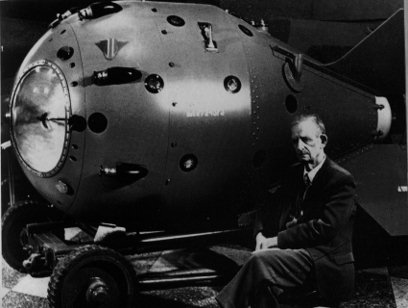Western Dependence On Russian Oil And Gas, And Western Military Adventurism, Leading To Newly Assertive Russian Military-Industrial Complex
... "Vyacheslav Nikonov, a political analyst close to the Kremlin, said Mr [Dick]Cheney’s remarks would have “negative consequences for Russian-American relations”.
“When making these kind of statements, you always have to keep in mind what the reaction from the other side will be, and it’s difficult for me to imagine that Russia is simply going to agree with these reproaches,” he said.
Professor Peter Reddaway of George Washington University said more militant elements in the Russian foreign policy establishment were putting pressure on Mr Putin, whom he regards as more of a moderate by comparison. Powerful lobbies include the nuclear and arms exporters.
“Putin is not fully in control of his own foreign policy with powerful constituencies he cannot offend,” prof Reddaway commented, describing the rise of a more assertive Russian foreign policy that sees the west’s dependency on Russia’s oil and gas as a tool for dictating terms."
Guy Dinmore, Neil Buckley, and Stefan Wagstyl "Cheney’s robust approach is a serious gamble" The Financial Times May 4, 2006
http://news.ft.com/cms/s/c94f8bbe-dba8-11da-98a8-0000779e2340.html

A recent picture of Yuli Khariton with a copy of the weaponized Joe-1, the first Soviet atomic bomb.
"One 19 December 1996, Yuli Khariton, one of the fathers of the Soviet nuclear arms program, died at age 92. Khariton was born Feb. 27, 1904 in St. Petersburg, Russia.
Khariton was one of the elite group of physicists who, with Igor Kurchatov initiated the Soviet atomic weapons program in the 1940s. He helped found the secret nuclear weapons complex at Sarov, renamed Arzamas-16 (and nicknamed "Los Arzamas"), in April 1946 and became its first Scientific Director, a position he held for 45 years. After the collapse of the Soviet Union, the name Sarov was restored, and that is where Khariton died . For his work in developing the first Soviet atomic bomb, and then hydrogen weapons, he was named a three-time winner of the title of Hero of Socialist Labour, the Soviet Union's highest civilian award. His body will be flown from Sarov to Moscow to be buried at the capital's elite Novodevichye cemetery.
Khariton studied under the pioneering British physicist Ernest Rutherford from 1926 to 1928 at Cambridge's Cavendish Laboratory where the neutron was later discovered in 1932. Khariton was probably Rutherford's last living pupil."
Text and photo credit:
www.nuclearweaponarchive.org/Russia/Khariton.html With thanks.
“When making these kind of statements, you always have to keep in mind what the reaction from the other side will be, and it’s difficult for me to imagine that Russia is simply going to agree with these reproaches,” he said.
Professor Peter Reddaway of George Washington University said more militant elements in the Russian foreign policy establishment were putting pressure on Mr Putin, whom he regards as more of a moderate by comparison. Powerful lobbies include the nuclear and arms exporters.
“Putin is not fully in control of his own foreign policy with powerful constituencies he cannot offend,” prof Reddaway commented, describing the rise of a more assertive Russian foreign policy that sees the west’s dependency on Russia’s oil and gas as a tool for dictating terms."
Guy Dinmore, Neil Buckley, and Stefan Wagstyl "Cheney’s robust approach is a serious gamble" The Financial Times May 4, 2006
http://news.ft.com/cms/s/c94f8bbe-dba8-11da-98a8-0000779e2340.html

A recent picture of Yuli Khariton with a copy of the weaponized Joe-1, the first Soviet atomic bomb.
"One 19 December 1996, Yuli Khariton, one of the fathers of the Soviet nuclear arms program, died at age 92. Khariton was born Feb. 27, 1904 in St. Petersburg, Russia.
Khariton was one of the elite group of physicists who, with Igor Kurchatov initiated the Soviet atomic weapons program in the 1940s. He helped found the secret nuclear weapons complex at Sarov, renamed Arzamas-16 (and nicknamed "Los Arzamas"), in April 1946 and became its first Scientific Director, a position he held for 45 years. After the collapse of the Soviet Union, the name Sarov was restored, and that is where Khariton died . For his work in developing the first Soviet atomic bomb, and then hydrogen weapons, he was named a three-time winner of the title of Hero of Socialist Labour, the Soviet Union's highest civilian award. His body will be flown from Sarov to Moscow to be buried at the capital's elite Novodevichye cemetery.
Khariton studied under the pioneering British physicist Ernest Rutherford from 1926 to 1928 at Cambridge's Cavendish Laboratory where the neutron was later discovered in 1932. Khariton was probably Rutherford's last living pupil."
Text and photo credit:
www.nuclearweaponarchive.org/Russia/Khariton.html With thanks.


0 Comments:
Post a Comment
<< Home